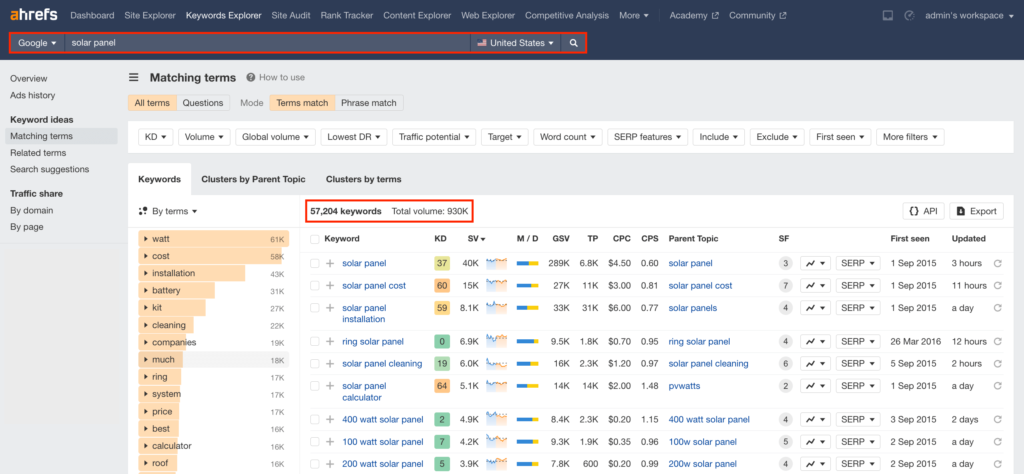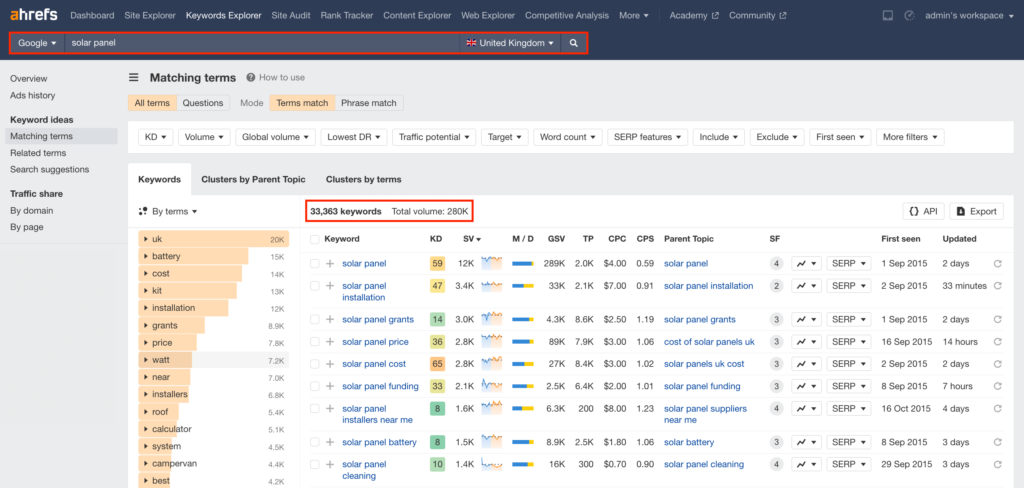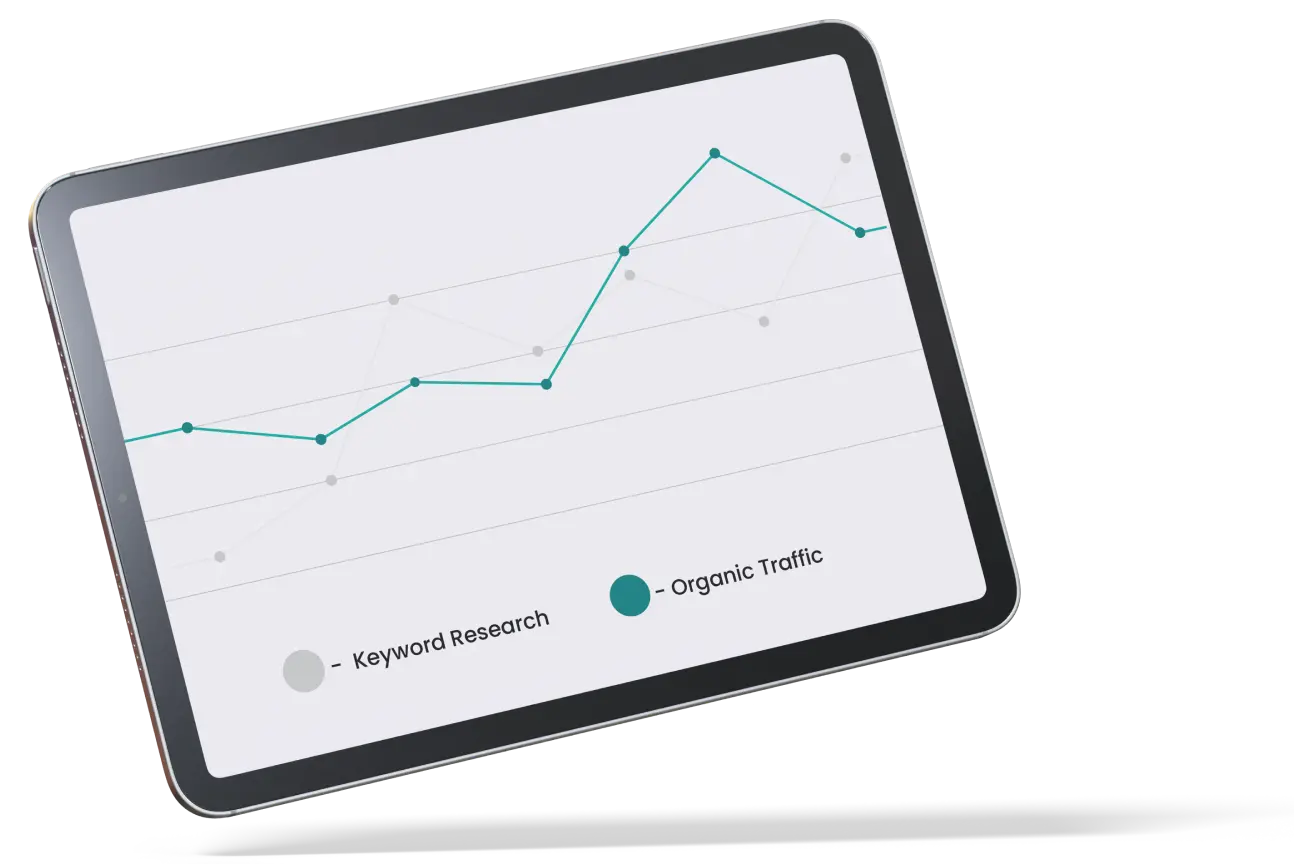Best SEO Keywords for Solar Panels

Boosting your online visibility is crucial for attracting customers to your solar energy renewable business. Optimizing your website with the best SEO keywords can significantly improve your search engine rankings. This guide will help you understand which keywords for solar energy are most effective and how to implement them in your SEO strategy.
What Are Solar Energy Keywords?
SEO keywords are terms and phrases that people use when searching for information online. In the context of solar power, these keywords are crucial for making your business visible to potential customers. Proper use of these solar energy keywords helps search engines understand your content, increasing the chances of your website appearing in relevant search results.
- United States: 57,204 keywords — Total volume: 930K

- United Kingdom: 33,363 keywords — Total volume: 280K

How to Do Solar Keyword Research
Selecting the right solar energy keywords for your business involves thorough research. Here are some tips and strategies to help you identify the most effective SEO keywords for solar:
Competitor Analysis
To outperform your competitors, start by analyzing their keyword strategies. Use tools like Google Keyword Planner, Ahrefs, and Semrush to identify the keywords they rank for. This insight can guide you in selecting solar energy keywords that have high search volumes and low competition.
- Google Keyword Planner: Free tool for discovering keywords and their search volumes.
- Ahrefs: Provides detailed competitor keyword analysis and backlink data.
- Semrush: Offers comprehensive solar company keyword research, competitive analysis, and tracking.
Content Strategy for SEO
Creating content that targets your chosen SEO keywords for solar is essential for driving organic traffic. Write informative blog posts and articles that address common questions and concerns in the solar industry. Use images, infographics, and videos to make your content more engaging and SEO-friendly.
On-Page SEO Optimization
Optimize your web pages by crafting effective meta tags and descriptions. Proper use of header tags (H1, H2, and H3) and strategic keyword placement can improve your search engine rankings. Ensure your content is relevant and provides value to your audience.
Off-Page SEO Strategies
If you build backlinks from reputable websites, it can significantly boost your domain authority. Engage with social media platforms to increase your online presence and attract more visitors to your site. These strategies will improve your overall solar SEO and drive more traffic to your business.
Top SEO Keywords for Solar Companies
Boosting your online visibility is crucial for attracting customers to your solar business. Optimizing your website with the best SEO keywords can significantly improve your search engine rankings. This guide will help you understand which solar energy keywords are most effective in the solar industry and how to implement them in your SEO strategy.
Here is the table with examples of solar keywords and their search volume and cost per click:
| Keyword | Global Search Volume | Cost Per Click |
| solar system | 1.1M | $3.00 |
| solar panels | 353K | $4.50 |
| energia solar | 268K | $2.50 |
| solar energy | 205K | $4.50 |
| solar system planets | 125K | $0.90 |
| solar power | 98K | $4.50 |
| what is solar energy | 31K | $1.90 |
| best solar panels | 22K | $3.00 |
| solar panels for sale | 22K | $2.50 |
| solar batteries | 19K | $1.10 |
| advantages of solar energy | 18K | $1.90 |
| solar companies | 17K | $5.00 |
| solar power system | 17K | $3.00 |
| net metering | 16K | $0.60 |
| sunpower solar panels | 12K | $3.50 |
| solar energy definition | 10K | $1.80 |
| solar energy system | 8.1K | $3.50 |
| solar energy companies | 7.2K | $5.00 |
| best solar companies | 7.0K | $3.00 |
| buy solar panels | 4.9K | $3.50 |
Keywords for Solar Panel Installation
Specific keywords to target for solar panel installation services can help you attract more customers searching for these services. Here are some essential solar keywords:
Residential Solar Installation
These keywords are ideal for targeting homeowners looking to install solar systems and solar panels worth:
| Keyword | Global Search Volume | Cost Per Click |
| solar panels for home | 27K | $4.50 |
| home solar system | 7.3K | $3.00 |
| solar system for home | 6.5K | $4.50 |
| home solar panels | 5.7K | $4.00 |
| residential solar panels | 5.1K | $4.50 |
| solar power for home | 4.4K | $3.50 |
| solar batteries for home | 3.5K | $2.50 |
| solar power system for home | 2.8K | $4.50 |
| solar panel system for home | 2.4K | $4.50 |
| residential solar systems | 2.1K | $4.00 |
| residential solar panel installation | 2.0K | $6.00 |
| residential solar power | 1.9K | $4.00 |
| solar electricity for home | 1.5K | $4.50 |
| solar energy for home | 1.4K | $4.50 |
| residential solar power systems | 1.1K | $5.00 |
Commercial Solar Installation
For businesses looking to install solar panels, these solar keywords are effective:
| Keyword | Global Search Volume | Cost Per Click |
| commercial solar panels | 6.9K | $4.00 |
| commercial solar company | 5.3K | $6.00 |
| commercial solar installation | 5.0K | $6.00 |
| commercial solar panel installation | 4.3K | $6.00 |
| commercial solar power | 2.2K | $4.00 |
| commercial solar systems | 2.0K | $5.00 |
| solar panels for business | 1.6K | $3.50 |
| industrial solar panels | 1.6K | $2.00 |
| solar panels for commercial buildings | 1.4K | $6.00 |
| commercial solar power systems | 900 | $5.00 |
| industrial solar panel installation | 500 | $5.00 |
| solar power for business | 350 | $3.50 |
| industrial solar installation | 300 | $6.00 |
| solar system for business | 300 | $4.00 |
| solar panels for office buildings | 100 | $6.00 |
Local SEO Keywords

Local SEO is essential for attracting customers in your area. Using location-specific solar panel keywords and incorporating local SEO services can improve your search engine rankings and attract local customers. Here are some examples of effective local SEO keywords for the solar industry:
- Solar installation [City/Region]
- Solar company [City/Region]
- Solar panel installation [City/Region]
- Solar energy [City/Region]
- Best solar company [City/Region]
- Solar energy provider [City/Region]
- Solar panel installer [City/Region]
- Solar energy company [City/Region]
- Local solar installer [City/Region]
- Solar system [City/Region]
City-Specific Keywords
Including city names in your keywords can attract local customers searching for solar services in their area.
London Solar Keywords
London has significant rooftop solar potential and hosts innovative solar projects. Here you can see examples of solar system keywords you can use for your SEO efforts:
| Keyword | Global Search Volume | Cost Per Click |
| solar panels london | 700 | $5.00 |
| solar panel installers london | 450 | $4.00 |
| solar panel installation london | 250 | $1.00 |
| solar installer london | 200 | $1.00 |
| solar power london | 200 | $1.00 |
| solar panel installer london | 100 | $0.00 |
| solar panels london uk | 90 | $0.00 |
| solar panel companies london | 90 | $0.00 |
Las Vegas Solar Keywords
Las Vegas boasts a high number of solar installations, including both residential and commercial projects. These are solar related keywords you can use for marketing:
| Keyword | Global Search Volume | Cost Per Click |
| solar las vegas | 1.3K | $8.00 |
| solar companies in las vegas | 1.2K | $8.00 |
| solar panels las vegas | 1.1K | $7.00 |
| best solar company in las vegas | 600 | $7.00 |
| solar panel installation las vegas | 200 | $8.00 |
| solar company las vegas | 200 | $8.00 |
| solar installers las vegas | 150 | $0.00 |
| las vegas solar power | 150 | $8.00 |
| solar power las vegas | 150 | $8.00 |
| solar energy las vegas | 150 | $8.00 |
State-Specific Keywords
Including state names in your solar related keywords can help you reach a broader audience within a state.
California Solar Keywords
California is a global leader in the solar industry, with a rich history of innovation and adoption of solar power.
| Keyword | Global Search Volume | Cost Per Click |
| solar panels california | 3.2K | $10.00 |
| best solar companies in california | 700 | $7.00 |
| solar companies in california | 600 | $4.00 |
| solar companies california | 400 | $4.50 |
| solar energy california | 350 | $7.00 |
| solar panels in california | 300 | $6.00 |
| solar installer california | 200 | $6.00 |
| solar power california | 200 | $4.50 |
| california solar installers | 200 | $6.00 |
| best solar panels california | 150 | $8.00 |
Texas Solar Keywords
Texas ranks among the top states in the United States for solar installations. Both utility-scale solar farms and residential rooftop solar systems are increasingly common across the state.
| Keyword | Global Search Volume | Cost Per Click |
| solar panels in texas | 2.5K | $6.00 |
| solar panels texas | 1.4K | $10.00 |
| best solar companies in texas | 1.2K | $8.00 |
| texas solar panels | 700 | $10.00 |
| solar power texas | 350 | $7.00 |
| solar energy texas | 350 | $10.00 |
| solar companies texas | 250 | $4.50 |
Long-Tail Solar Keywords
Long-tail keywords are highly specific phrases that consumers are more likely to use when they are closer to making a purchase or when they are using voice search. These keywords are typically longer and more detailed than regular keywords. Although they tend to have lower search volumes, they often attract more targeted traffic and can improve conversion rates.
Benefits of Long-Tail Keywords for SEO
- Higher Conversion Rates: Long-tail keywords are often used by people who are ready to make a purchase, leading to higher conversion rates.
- Less Competition: These keywords usually have less competition, making it easier to rank higher in search results.
- Better Targeting: Long-tail keywords attract more specific and relevant traffic to your website.
Voice Search Optimization: With the rise of voice search, long-tail keywords that match natural speech patterns are becoming increasingly important.
| Keyword | Global Search Volume | Cost Per Click |
| what is solar energy | 31K | $1.90 |
| how do solar panels work | 22K | $0.15 |
| how much do solar panels cost | 12K | $3.00 |
| how long do solar panels last | 10K | $0.25 |
| how many solar panels do i need | 9.8K | $2.00 |
| how solar panels work | 9.4K | $0.80 |
| how to install solar panels | 3.8K | $1.50 |
| how to install solar panels on roof | 1.8K | $2.00 |
| what is solar energy used for | 1.8K | $1.20 |
| how to install solar panels step by step | 1.0K | $1.40 |
Common SEO Mistakes to Avoid
Search engine optimization (SEO) is crucial for improving the visibility and ranking of your website on search engines. However, many businesses make mistakes that can harm their SEO efforts. This article will explore some of these common mistakes and provide tips on how to avoid them, focusing on keyword stuffing, using irrelevant keywords, and keyword cannibalization.
Dominate Solar Search
Results with Us!
Schedule a free consultation to learn how to attract more qualified leads and drive conversions for your solar panel website.

Keyword Stuffing
Keyword stuffing is the practice of overloading a webpage with solar related keywords in an attempt to manipulate its ranking in search engine results. This outdated tactic can do more harm than good, negatively affecting user experience and search engine rankings.
The Pitfalls of Keyword Stuffing
- Poor User Experience: When a page is filled with repetitive keywords, it becomes difficult and frustrating for visitors to read. This negatively affects the user experience, leading to higher bounce rates and lower conversion rates. Users are looking for valuable information, not keyword-packed content that disrupts the flow of reading.
- Search Engine Penalties: Search engines, particularly Google, are sophisticated enough to detect keyword stuffing. Sites that engage in this practice can be penalized, resulting in lower rankings or even removal from search engine indexes. Google’s algorithms prioritize quality content that provides real value to users.
- Reduced Credibility: Overusing keywords can make your content seem spammy and untrustworthy. Readers are likely to perceive it as low-quality content, which can damage your brand’s reputation. Trust and credibility are vital for building a loyal audience and achieving long-term success.
Identifying Keyword Stuffing
Recognizing keyword stuffing is crucial to maintaining good SEO practices. Here are some signs that indicate keyword stuffing:
- Unnatural Keyword Repetition: If a keyword is repeated too frequently within the content, it disrupts the natural flow of the text. For example, “Buy solar panels from the best solar panel provider for solar panel installation of solar panels.”
- Irrelevant Keywords: Including keywords that are not relevant to the content or context of the page is a clear sign of keyword stuffing. This misleads both search engines and users.
- Hidden Keywords: Using hidden text (e.g., white text on a white background) or placing keywords in non-visible areas of the webpage (e.g., metadata) is a deceptive practice often associated with keyword stuffing.
Best Practices to Avoid Keyword Stuffing
To ensure you are using keywords effectively without resorting to keyword stuffing, follow these best practices:
- Focus on User Experience: Write content that is informative, engaging, and valuable to your audience. Keywords should naturally fit into the context of the content. Prioritize readability and relevance over keyword density.
- Use Synonyms and Related Terms: Instead of repeating the same keyword, use synonyms and related terms to avoid redundancy and maintain the readability of your content. For instance, instead of repeatedly using “solar panels,” you can use “photovoltaic panels.” Or instead of “solar energy cost analysis,” you can use “solar power cost.”
- Maintain a Balanced Keyword Density: Aim for a keyword density of around 1-2%. This means that your primary keyword should appear once or twice per 100 words. Tools like Yoast SEO can help you monitor keyword density and ensure it stays within an optimal range.
- Leverage Latent Semantic Indexing (LSI) Keywords: LSI keywords are terms and phrases that are semantically related to your primary keyword. Including these in your content can help improve relevance without keyword stuffing. For example, for “solar panels,” LSI keywords might include “renewable energy,” “solar power,” and “sustainable energy solutions.”
- Create High-Quality Content: Focus on creating comprehensive and high-quality content that addresses the needs and interests of your audience. For example, you can write about solar energy advantages. This naturally incorporates relevant keywords without overloading the text. High-quality content is more likely to earn backlinks and social shares, further boosting your SEO efforts.
By avoiding keyword stuffing and focusing on creating valuable content, you can improve your SEO performance and provide a better experience for your audience. Remember, search engines are designed to serve users with the best possible results, and your content should align with this goal.
Using Irrelevant Keywords
Using irrelevant keywords in your content is another common SEO mistake. This practice can lead to poor search engine rankings and a negative user experience. In this section, we will discuss why using irrelevant keywords is detrimental and how to ensure your keywords are relevant and effective.
The Consequences of Using Irrelevant Keywords
- Poor Search Engine Rankings: Search engines strive to provide users with the most relevant results. If your content includes keywords that do not match the intent of your audience, it is less likely to rank well in search results. Search engines use algorithms to understand the context and relevance of your content.
- High Bounce Rates: When users land on your page expecting to find information related to a specific keyword but instead encounter irrelevant content, they are likely to leave quickly. This increases your bounce rate, signaling to search engines that your content is not meeting user needs. A high bounce rate can negatively impact your SEO rankings.
- Lower Conversion Rates: Attracting visitors with irrelevant keywords means they are less likely to find what they are looking for on your site. This reduces the likelihood of converting them into customers or leads. Conversion rates are crucial for the success of your online business, and irrelevant keywords can significantly hinder this.
- Damaged Credibility: Misleading users with irrelevant keywords can damage your brand’s credibility and trustworthiness. Users may view your site as unreliable and be less likely to return in the future. Building and maintaining trust with your audience is essential for long-term success.
How to Ensure Keyword Relevance
To avoid the pitfalls of using irrelevant keywords, follow these guidelines:
- Understand User Intent: Conduct thorough keyword research to understand what your target audience is searching for and their intent behind those searches. This ensures that your keywords align with the content and purpose of your page. User intent can be categorized into informational, navigational, and transactional intents.
- Use Relevant Keywords: Choose keywords that are directly related to your content and business. Ensure that the keywords you use accurately represent the information provided on your page. For example, if your page is about solar panel installation, relevant keywords might include “solar installation services,” “residential solar panels,” and “commercial solar solutions.”
- Update Keyword Strategy Regularly: SEO is an ongoing process, and user search behavior can change over time. Regularly review and update your keyword strategy to ensure it remains relevant and effective. Use tools like Google Trends, Ahrefs, and SEMrush to stay informed about the latest keyword trends and search patterns.
- Analyze Competitor Keywords: Look at the keywords your competitors are using and identify which ones are driving traffic to their sites. This can provide insights into relevant keywords you might be missing. Competitor analysis can also help you discover new opportunities for keyword targeting.
- Use Long-Tail Keywords: Long-tail keywords are more specific phrases that tend to have lower search volumes but higher conversion rates. They are often less competitive and can attract highly targeted traffic. For example, “affordable solar panel installation for homes” is a long-tail keyword that targets users looking for specific information.
By using relevant keywords that match user intent, you can improve your search engine rankings, attract more targeted traffic, and enhance user experience. Relevance is key in SEO, and aligning your keywords with the needs and expectations of your audience will lead to better results.
Keyword Cannibalization
Keyword cannibalization occurs when multiple pages on your website are competing for the same keyword. This can dilute your SEO efforts and confuse search engines about which page to rank for a particular keyword. Understanding and avoiding keyword cannibalization is essential for optimizing your site’s performance.
Keyword cannibalization happens when:
- Multiple Pages Target the Same Keyword: If you have several pages optimized for the same keyword, they will compete against each other in search engine rankings. This can split the potential traffic and reduce the effectiveness of your SEO strategy.
- Duplicate Content: Having similar or duplicate content across multiple pages can lead to keyword cannibalization. Search engines may struggle to determine which page is the most relevant for a particular search query.
- Internal Competition: When your pages compete internally for the same keyword, it can dilute the authority and ranking potential of each page. This internal competition can weaken your overall SEO efforts.
The Consequences of Keyword Cannibalization
- Reduced Rankings: When multiple pages compete for the same keyword, search engines may struggle to determine which page to rank higher. This can result in lower rankings for all competing pages.
- Confused Search Engines: Keyword cannibalization can confuse search engines about which page to index and display in search results. This can lead to inconsistent and unpredictable rankings.
- Lower Click-Through Rates (CTR): When multiple pages appear for the same keyword, it can dilute the CTR for each page. Users may be less likely to click on your pages if they see multiple options from the same site.
- Wasted SEO Efforts: Optimizing multiple pages for the same keyword can waste your SEO resources and efforts. Instead of consolidating your efforts into one high-quality page, you end up spreading them thin across several pages.
How to Identify and Avoid Keyword Cannibalization
To avoid keyword cannibalization and ensure your SEO efforts are focused and effective, follow these steps:
- Conduct a Content Audit: Regularly review your website’s content to identify pages targeting the same keyword. Tools like Screaming Frog, Ahrefs, and SEMrush can help you conduct a thorough content audit and identify instances of keyword cannibalization.
- Consolidate Similar Content: If you find multiple pages targeting the same keyword, consider consolidating them into a single, comprehensive page. This can improve the overall quality and authority of the content, making it more likely to rank highly in search results.
- Use Internal Linking Strategically: Internal linking can guide search engines and users to the most relevant page for a particular keyword. Use internal links to connect related content and direct authority to the primary page you want to rank for a specific keyword.
- Optimize Unique Keywords for Each Page: Ensure that each page on your site targets unique keywords and topics. This can prevent internal competition and improve the overall relevance and authority of your content.
- Implement Canonical Tags: If you have similar content that cannot be consolidated, use canonical tags to indicate the preferred version of a page to search engines. This can prevent duplicate content issues and reduce keyword cannibalization.
- Monitor Your Rankings: Regularly monitor your search engine rankings to identify any fluctuations or issues that may indicate keyword cannibalization. Tools like Google Search Console, Ahrefs, and SEMrush can help you track your rankings and detect potential problems.
Optimizing your solar business website with effective SEO keywords is crucial for boosting online visibility and attracting potential customers. To achieve this, conduct thorough keyword research using tools like Google Keyword Planner, Ahrefs, and SEMrush. Focus on competitor analysis, create a robust content strategy, and implement both on-page and off-page SEO techniques.
Prioritize high-value SEO keywords for solar, including those specific to residential and commercial solar installations, as well as local and long-tail keywords, to target more precise search queries. Avoid common SEO mistakes like keyword stuffing, using irrelevant keywords, and keyword cannibalization to maintain a high-quality and user-friendly website. By adhering to these strategies, your solar business can improve search engine rankings, attract more targeted traffic, and ultimately increase conversion rates.

FAQs
How do local SEO keywords improve my solar energy business’s visibility?
Local SEO keywords help your solar business appear in search results for users in your specific geographic area. By including location-specific terms like “solar panel installation [City/Region]” or “best solar company [City/Region],” you can attract local customers searching for services in your vicinity. This targeted approach increases the likelihood of your business showing up in local search results, Google Maps, and local directories, thereby enhancing your visibility to potential customers nearby.
How often should I update my SEO keywords for the best results?
You should review and update your SEO keywords for solar niches at least every six months. This ensures your keywords remain relevant to current search trends and user behaviors. Additionally, regular updates help you stay ahead of competitors and adapt to changes in your industry. Use tools like Google Trends, Ahrefs, and SEMrush to monitor keyword performance and identify new opportunities for optimization.
How can I track the success of my SEO keyword strategy?
Tracking the success of your SEO keyword strategy involves using several tools and metrics:
- Google Analytics: Monitor organic traffic, user behavior, and conversion rates on your website.
- Google Search Console: Check your site’s search performance, keyword rankings, and click-through rates (CTR).
- Ahrefs/SEMrush: Analyze keyword rankings, backlink profiles, and competitor performance.
- Keyword Tracking Tools: Regularly track the performance of your targeted keywords to see how they rank over time.
By analyzing these metrics, you can assess the effectiveness of your SEO efforts and make data-driven decisions to improve your strategy.




